Could you sun scream be damaging your
health? New research suggests it’s time to rethink your sun-protection strategy
We’ve long been told to slap on the sun cream
to protect against skin cancer. But now worrying new evidence is revealing that
rather than protect you, some sun creams could be so laden with chemicals they
may harm you instead. In addition, some of us may be covering up so effectively
we’re failing to replenish our stores of vitamin D.
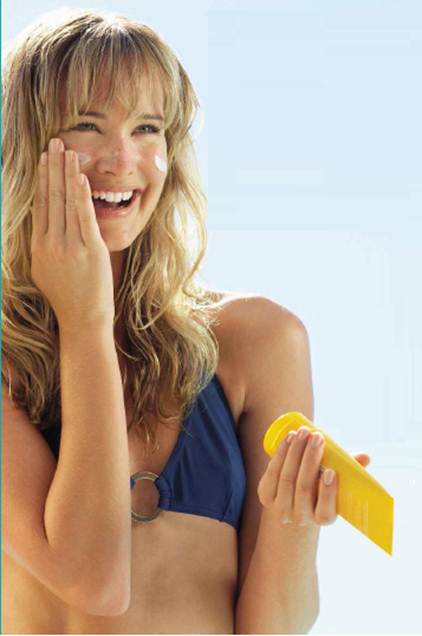
The
new sun-safety rules
Sunscreens work in two ways – either as a
barrier on the skin or by penetrating the skin and absorbing UV light. But just
what ingredients are getting into our skin? One recent study, led by chemistry
professor Yinfa Ma from Missouri University in the US, has flagged up the
potential danger of nanoparticles used in some barrier sunscreens. His study
found that when exposed to sunlight, the nanoparticles (small particles that
behave as a whole unit) undergo a chemical reaction that releases free-radical
molecules into your body. Emily Kavanaugh, organic skin care producer and
director at purenuffstuff.co.uk warns against using sunscreens containing these
nanoparticles, found in mass market, high-street products rather than natural
or organic items. ‘Nanoparticles are the tiniest form of chemicals that can
enter the bloodstream, and they’re best avoided,’ she says.
Get sunscreen smart
‘Natural’ sun-care products are almost
always of the barrier type and use the minerals zinc oxide or titanium dioxide
– but in larger particles rather than the more worrying nanoparticles.
A new, sophisticated generation of natural
sun creams uses ‘micro light’ or finely ground minerals instead. ‘Years ago,
natural barrier creams used to leave traces of white mineral on your skin. The
new micro light creams sit on the surface of the skin and look much better,’
explains Sharon Cass, skincare specialist at Priori skincare.
The older creams were absorbed by the skin
and often used chemicals such as Alcohol Denat to enhance penetration. ‘You
don’t need to be a chemist to realize that whatever else is in the bottle is
more likely to be taken in your skin along with the alcohol,’ says Kavanaugh.
And in high street creams, this can often mean chemical preservatives,
artificial colourants and perfumes.
In its 2012 Sunscreen Guide, the
Environmental Working Group warns there may be harmful ingredients in some
sunscreens, including Retinyl Palmitate and Oxybenzone that may cause allergic
reactions and hormone disruption. Other nasties to look out for are
petrochemicals, Parabens and phthalates. ‘The danger isn’t down to one or two
chemicals. Instead, it’s the cocktail effect of the combination of chemicals,’
says Kavanaugh.
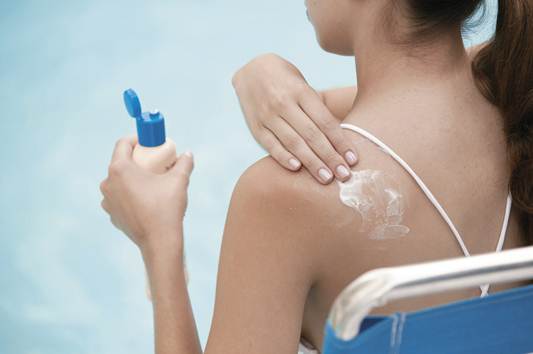
‘The
danger isn’t down to one or two chemicals. Instead, it’s the cocktail effect of
the combination of chemicals,’
With no test for the long-term dangers of
such a cocktail, the best advice is to keep your exposure to a minimum by using
the most natural, organic products available and covering up whenever possible.
But make sure you let enough sunlight reach your skin to top up vitamin D
levels.
Healthy Sun Care strategies
1. Change your sunscreen
Read the label and choose a product with as
few chemicals as possible. Ideally, choose a physical barrier sunscreen that
uses sun-blocking minerals such as zinc oxide and titanium dioxide, but avoid
one that includes them in nanoparticles form. At present, there’s no law that
says manufacturers have to state whether a product contains nanoparticles on
the label. However, as a rule of thumb, ‘organic’ and ‘natural’ products don’t
contain them and are free from nasty preservatives, artificial colourants and
perfumes, so these are likely to be safer.
2. Apply it right
Instead of automatically slapping on
sunscreen without thinking about it, only apply it when you really need to.
It’s not much use if you’re spending the day indoors, or covering up your body
once you’ve applied it. Only apply it when you skin is exposed to the sun.
3. Cover up instead
Even better than slathering on sun cream is
covering up. Wear loose, cool clothing with long sleeves and a wide-brimmed hat
to protect your face and neck. Or try Sunsibility UV protective clothing
(sensibility.co.uk), with a built-in sun protection factor 50. The company also
sells arm bands that change colour when you’ve had too much sun.
4. Top up your vitamin D
While it’s important to protect your skin,
you still need a regular dose of sunlight to top up your vitamin D levels.
‘Vitamin D maintains strong bones and a healthy immune systems,’ says Dr
William Marshall, clinical biochemist at The London Clinic. It also regulates
normal cellular differentiation, helping prevent cancer. The amount of sun
exposure you need is relatively small and won’t put you at risk of skin cancer,
about 20 minutes between 10am and 3pm three times a week during the summer,’ he
says.
Five healthy sun-care products
1. Green People Sun Lotion SPF25
Price: $ 28 for 200ml
Website: greenpwople.co.uk
Part of an award-wining natural sun-care
and body range, this is zinc oxide-free and gives protection with titanium
dioxide.
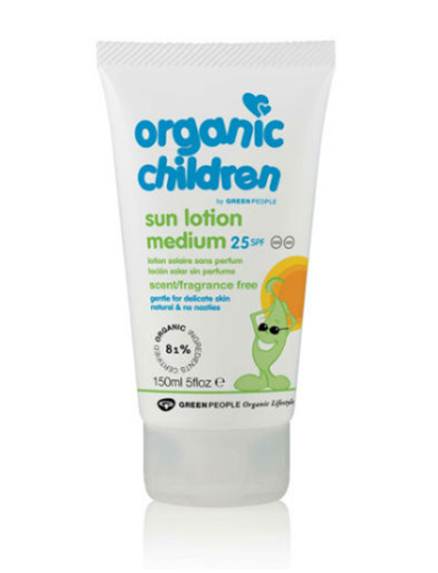
Green
People Sun Lotion SPF25
2. Suntegrity SPF30
Price: $38 for 118ml
Price: tinarichards.com
Uses nano-free zinc oxide plus anti-ageing
ingredients in a non-drying, non-greasy formula. Works well under make-up and
has gorgeous packaging as an added bonus.
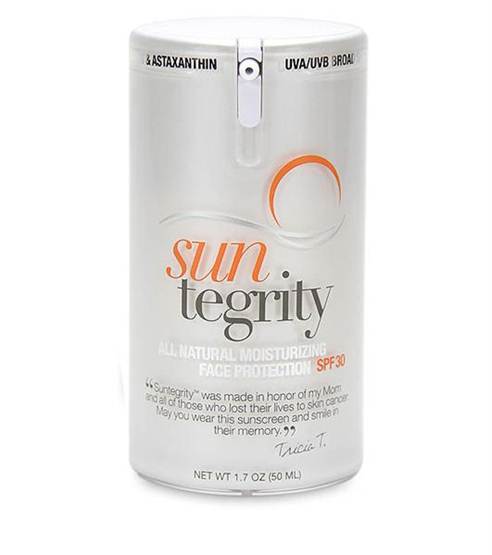
Suntegrity
SPF30
3. Aubrey Natural Sun Green Tea SPF30
Price: $22 for 118ml
Website: aubreyorganics.co.uk
Organic herbal sunscreen with antioxidant
green tea for extra protection against free-radical damage, plus jojoba and
shea butters to help soften skin
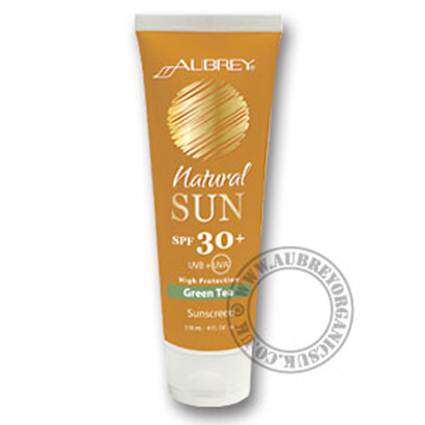
Aubrey
Natural Sun Green Tea SPF30
4. Priori Natural Daily Protection SPF25
Price: $63 for 120ml
Website: cosmestore.co.uk
The smooth finish has a slight tint, and
light-reflective particles add a sun-kissed glow.
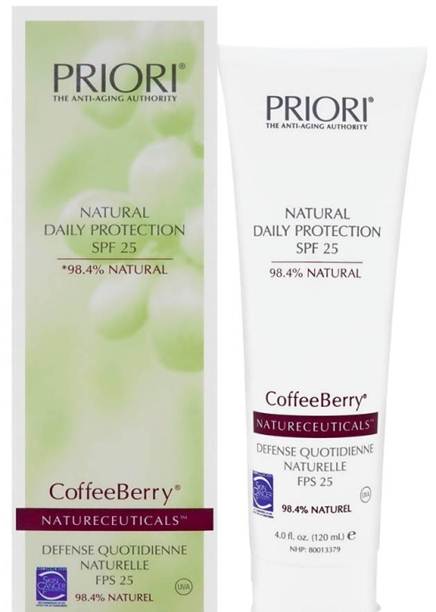
Priori
Natural Daily Protection SPF25
5. Pure Nuff Stuff SPF20 sunscreen
Price: $19 for 250ml
Website: purenuffstuff.co.uk
Chemival – and scent-free, with
moisturizing almond oil.
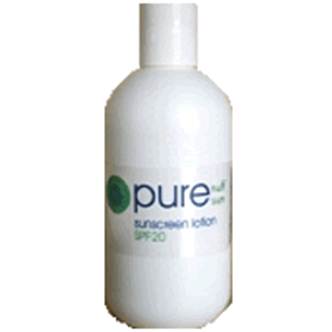
Pure
Nuff Stuff SPF20 sunscreen